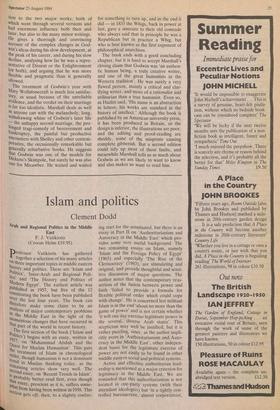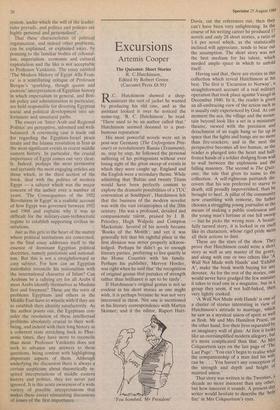Islam and politics
Clement Dodd
Arab and Regional Politics in the Middle East P. J. Vatikiotis (Croom Helm £19.95) professor Vatikiotis has gathered together a selection of his many articles on three important topics in middle eastern history and politics. These are 'Islam and 'Inter-Arab and Regional Poli- tics' and 'The History and Politics of Modern Egypt'. The earliest article was Published in 1957, but five of the 12 constituting the book have been published over the last four years. The book can therefore make some claim to be an analysis of major contemporary problems 'h the Middle East in the light of the Momentous changes that have occurred in that part of the world in recent history. The first section of the book ('Islam and politics') begins with an essay, written in ,1957, on 'Muhammad Abduh and the Quest for Muslim Humanism'. This puts the treatment of Islam in chronological torder, though humanism is not a dominant
remaining in Muslim thinking today, as the
second articles show very well. The essay, on 'Recent Trends in Islam', I Probably better read first, even though that essay, prescient as it is, suffers some- what from having been written in 1958. This section gets off, then, to a slightly confus-. ing start for the uninitiated, but there is an essay in Part II on 'Authoritarianism and Autocracy in the Middle East' which pro- vides some very useful background. The two remaining essays on Islam, namely 'Islam and the Foreign Policy of Egypt' (1965) and especially 'The Rise of the Clerisocracy' (1983), are stimulating and original, and provide thoughtful and sensi- tive discussion of major questions. The author notes that the contemporary reas- sertion of the fusion between power and faith 'failed to provide a formula for flexible political order which could cope with change'. He is concerned lest militant Islam is in the end 'about no more than the game of power' and is not certain whether 'it will one day exercise legitimate power in the several, diverse Arab states'. This scepticism may well be justified, but it is rather puzzling, since, as the author impli- citly avers in 'Authoritarianism and Auto- cracy in the Middle East', other indepen- dent bases for the legitimate exercise of power are not easily to be found in other middle eastern social and political systems.
Active and effective authoritarian lead- ership is mentioned as a major criterion for legitimacy in the Middle East. We are reminded that this authoritarianism is not located in one-party systems (with their attendant ideologies) but 'in a tightly con- trolled bureaucratic, almost corporativist, system, under which the will of the leader- ruler prevails, and politics and policies are highly personal and personalised'.
That these characteristics of political organisation, and indeed other problems, can be explained, or explained away, by pointing to the familiar bodies of colonial- ism, imperialism, economic and cultural exploitation and the like is not acceptable to Professor Vatikiotis. The essay entitled 'The Modern History of Egypt Alla Fran- ca' is a scintillating critique of Professor Berque's 'sparkling, though quaint and esoteric' interpretation of Egyptian history in which imperialism in general, and Brit- ish policy and administration in particular, are held responsible for diverting Egyptian social and political development into un- fortunate and unnatural paths.
The essays on 'Inter-Arab and Regional Politics' are perceptive, informed and well- balanced. A convincing case is made out for regarding the Egyptian-Israel peace treaty and the Islamic revolution in Iran as the most significant events in recent middle eastern history. In particular, the crucial importance of Egypt comes out very clear- ly. Indeed, perhaps the most persuasive and certainly the most engaging articles are those which, in the third section of the book, deal with the politics of modern Egypt — a subject which was the major concern of the author over a number of years. 'The Consequences of the 1952 Revolution in Egypt' is a realistic account of how Egypt was governed between 1952 and 1968 and explains why . it was so difficult for the military-cum-technocratic regime to establish supporting civilian in- stitutions.
Just as this gets to the heart of the matter where political institutions are concerned, so the final essay addresses itself to the essence of dominant Egyptian political doctrines, namely patriotism and national- ism. But this is not a straightforward or easy subject. For how can an Egyptian nationalist reconcile his nationalism with the international character of Islam? Can Arabism be a rallying cry for all Arabs if most Arabs identify themselves as Muslims first and foremost? These are the sorts of problems Egyptians and others in the Middle East have to wrestle with if they are to establish their identity satsifactorily. As the author points out, the Egyptians con- sider the resolution of these intellectual problems absolutely crucial to their well- being, and indeed with their long history as a coherent state stretching back to Phar- aonic times, they have more to reconcile than most. Professor Vatikiotis does not seek to advance any answers to these questions, being content with highlighting important aspects of them. Although underlying the discussion there is always a certain scepticism about theoretically in- spired interpretations of middle eastern history and politics, they are never just ignored. It is this acute awareness of a wide variety of possible interpretations that makes these essays stimulating discussions of issues of the first importance.







































 Previous page
Previous page